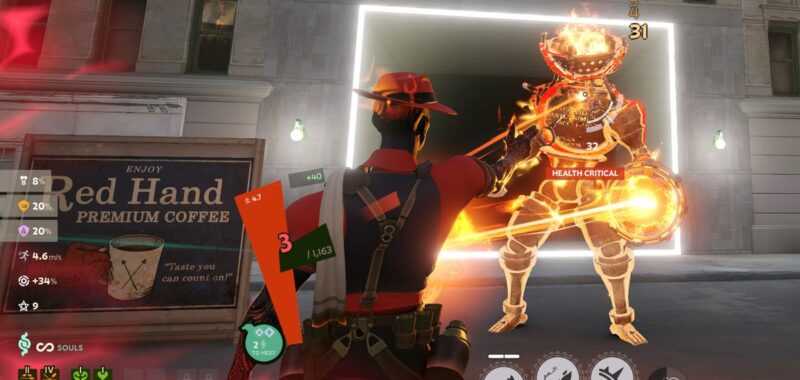It’s been nearly five years since Valve announced a truly new game — and counting. Valve has still not announced Deadlock, its new hero shooter that takes cues from Overwatch, Dota 2, Team Fortress 2 and more. But that hasn’t stopped nearly 20,000 people from trying the game, including me.
And I’m not under NDA. I have signed no contracts, made no verbal agreements; I haven’t even clicked through a EULA.
Earlier today, I received a no-strings-attached invite to play Deadlock on Steam. Steam claims the game is made by Valve. It displays Valve’s copyrighted logo when it launches, and its executable is digitally signed by “Valve Corp.” The game’s directories contain Valve legal notices and numerous other text files that reference Valve, and it feels like a Valve game. Though Valve didn’t respond to my requests for comment, I’m completely convinced that it’s legit.
So: what is Deadlock?
It’s a 6-on-6 shooter, like Overwatch, where your team of heroes attempts to dominate a map by slowly wearing down the opposing team and pushing them back. But you’re also leading an army of NPC grunts down four different lanes to destroy the opposing team’s stationary defenses, a little like Dota 2 or other MOBA games.
There’s no downtime. It’s a constant war between your team’s “Troopers” (the grunts) and the enemy team’s “Troopers,” which keep respawning and advancing on enemy positions, wave after wave. But they can’t break through unless the human-powered heroes lend them a hand with powerful weapons, abilities, and upgrades.
Nor can humans easily break through without their NPC army — or at least, that’s what I saw in my first match. To take down the flame-headed, energy spewing Guardians or hulking Walkers that block your passage, it takes at least a somewhat coordinated effort by one human and their little autonomous friends. Each match culminates in an all-hands-on-deck fight against the enemy’s Patron, a gigantic floating orb with arms and death rays.
When I say “coordinated,” I’m not talking about aiming. This isn’t a Valorant or Apex Legends-like game where snappy aim is key. It feels like Overwatch, or maybe even more so Team Fortress 2 in its floaty, wear-down-their-health gameplay. You can tank, heal, and retreat even if a tremendous amount of enemy fire is coming your way.
Each match does get deadlier and deadlier as you unlock your heroes’ abilities and buy skills, many of which give you more damage per second. Others provide life steal, shielding, and more. Every character also has strong and light melee attacks, and you can parry an incoming melee attack to stun your opponent.
1/4
It help that there are a lot of ways to dodge enemy bullets and traverse the map: you can slide, dash, air dash, dash jump, double jump, and mantle up to ledges. Each of the game’s four lanes also has an aerial tramway that lets you hitch free rides into (and out of) the fray.
The ziplines don’t feel overpowered; after an earlier leak, I’d once heard them compared to Titanfall’s attack-from-any-angle traversal gameplay, but Valve keeps them away from the actual firing lines. You have to retreat to territory you own before they work.
They also look like they’ll lead to a fascinating give-and-take mechanic as games progress. To power up, I needed to take my hero back to a shop to buy new perks with the souls I’d accumulated by destroying enemy troopers and heroes, but that left my territory undefended. By the time I returned, the front lines had been pushed back further than I would have liked.
Even in this “early development build,” there are already 20 different heroes, plenty of which look like they’ll be fun to play. Yes, some of them are common archetypes like the archer, swordsman, sniper, and shotgun teleport specialist, but it’s not all that simple: have you ever seen an Infernus who literally finger-guns his foes to pieces?
I initially gravitated towards Wraith thanks to her style and the tremendous dakka of her rapid-fire tommygun, then switched to McGinnis when I found out she’s the Team Fortress 2 engineer and heavy weapons specialist in one: turrets, barrier walls, and a giant minigun that fires faster the longer it goes.
I haven’t played enough yet to even begin to tell if the game’s well-balanced, or if there’s any kind of backstory for its heroes, but I’m eager to give it a go with my friends — and it seems like Valve will be just fine with that.
While Valve has yet to announce or even acknowledge this game’s existence publicly, the current build lets anyone with a copy invite as many Steam friends as they like to give it a try, too. That’s why I have an invite, and that’s why my friends now have an invite.
It’s an unusual way to release a game, but this is Valve we’re talking about — it’s an unusual company.

